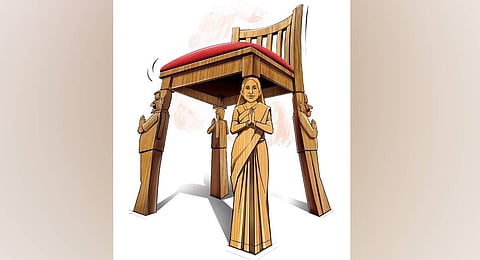

Twenty-seven years after it was first introduced as a Constitution amendment bill by former Prime Minister HD Deve Gowda, and thirteen years after it was passed in the Rajya Sabha, the women’s reservation bill may finally get the status of a statute. It seeks to give women 33 percent reservation in the Lok Sabha and state assemblies, and thus, a greater voice in lawmaking. The Modi government has introduced it in the Lok Sabha, but it is unlikely to be implemented before the 2029 national elections. The Census is due in 2027, after which a delimitation exercise will be held and reservation worked out. This comes as a big disappointment to those looking forward to a big change right away. There are many votaries of the bill who claim that reservation will definitely empower women. Recent studies of panchayats hold this true.
There are also the naysayers who predict that women will be stand-ins to win seats, while their husbands, sons and other male relatives will hold the reins. This has been proven true in rural and urban local bodies, which already have a quota for women, thanks to an early version of the bill introduced by the Rajiv Gandhi government in 1989. It is up to lawmakers to introduce checks and balances so that the legislation is not misused. It is strange that in a country where women stride alongside men in science, technology, sports, and business, they have failed to stake claim for their rightful half in parliament. Women make up less than fifteen percent of the current Lok Sabha, while the Rajya Sabha has a representation of about eleven percent. This is the story of state assemblies, too, with the figure slipping below ten percent. It is a stark reflection of the patriarchy of electoral politics.
While the BJP and the Congress are in favour of the bill, there is now a battle to take credit, with an eye on the elections. Congress leader Sonia Gandhi has stated “it is ours”, since it was passed in the Rajya Sabha during the UPA tenure, and Narendra Modi has claimed that god has chosen him to turn the bill into law. Just last month, the Supreme Court issued a sharp statement seeking a response from the Centre on a 2021 plea for reintroducing the reservation bill by the National Federation of Indian Women. Whatever its chequered path, the bill must be welcomed by all.